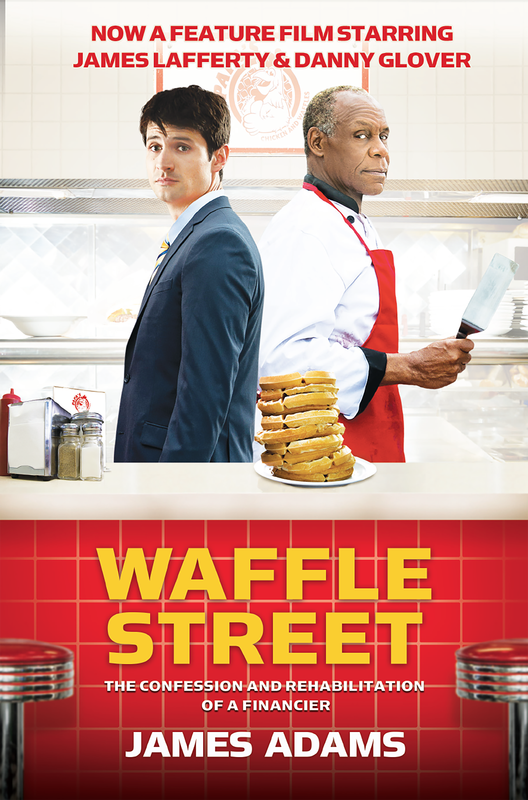Read the book that inspired the movie.
WAFFLE STREET A memoir by James Adams
Available in print and on Kindle at Amazon

WAFFLE STREET. MONEY WILL NEVER BE THE SAME. In the wake of the worst financial turmoil since the Great Depression, millions of Americans were left wondering how the economy actually works. The answers have finally arrived—in a most unconventional form.
After spending two years in the midst of the housing market hurricane, Jimmy Adams is laid off from a hedge fund in early 2009. Wearied by eight years in the bond market and disillusioned by the financial services profession, he decides to get an “honest job” for a change. Before he knows what hit him, Jimmy finds himself waiting on tables of barflies at his local waffle shop. Many colorful characters soon emerge: man-hungry female patrons, a stonemason who carves his own teeth, and a man seeking refuge from the ghost in his apartment.
Amidst the glorious chaos of the night shift, the 24-hour diner affords a bevy of comedic experiences as the author struggles to ingratiate himself with a motley crew of waiters and cooks. Unexpectedly, the restaurant also becomes a font of insight into financial markets and the human condition.
In a uniquely hilarious and thought-provoking narrative, Waffle Street unravels the enigmas of money, banking, economics, and grits once and for all. As they laugh heartily at the author’s expense, readers will develop a profound appreciation for the first principle of economics: there really is no such thing as a free lunch.
After spending two years in the midst of the housing market hurricane, Jimmy Adams is laid off from a hedge fund in early 2009. Wearied by eight years in the bond market and disillusioned by the financial services profession, he decides to get an “honest job” for a change. Before he knows what hit him, Jimmy finds himself waiting on tables of barflies at his local waffle shop. Many colorful characters soon emerge: man-hungry female patrons, a stonemason who carves his own teeth, and a man seeking refuge from the ghost in his apartment.
Amidst the glorious chaos of the night shift, the 24-hour diner affords a bevy of comedic experiences as the author struggles to ingratiate himself with a motley crew of waiters and cooks. Unexpectedly, the restaurant also becomes a font of insight into financial markets and the human condition.
In a uniquely hilarious and thought-provoking narrative, Waffle Street unravels the enigmas of money, banking, economics, and grits once and for all. As they laugh heartily at the author’s expense, readers will develop a profound appreciation for the first principle of economics: there really is no such thing as a free lunch.
About James Adams

AUTHOR OF WAFFLE STREET, JAMES ADAMS cut his teeth in the investment management industry as an analyst at Protective Life Insurance Co., where he assisted in the credit evaluation and relative value analysis of an $8 billion corporate bond portfolio. After three years at Protective, Jimmy joined Jefferson-Pilot Financial, trading and monitoring the credit quality of a $3 billion corporate bond portfolio comprised of 120 issuers. He was also instrumental in Jefferson-Pilot’s inaugural issue of $300 million funding agreement-backed notes in June 2005. In early 2006, Jimmy entered the placid waters of the mortgage bond market, where borrowers were known to repay their debts and fraud was a total anomaly. As a vice president in the product management group of a $30 billion money management firm, he serviced 40 client relationships by providing verbal and written commentary on performance, investment process, and portfolio positioning. After three harrowing years in the mortgage market maelstrom, Jimmy sought refuge inside the walls of a 24-hour waffle diner. Waiting tables on the weekend graveyard shift over the next six months, he got a lot more than he bargained for. Although he earned the Chartered Financial Analyst designation and an MBA in Finance, most of the author’s financial knowledge has been gleaned from his recent foray into food service and the writings of forgotten 19th-century economists.